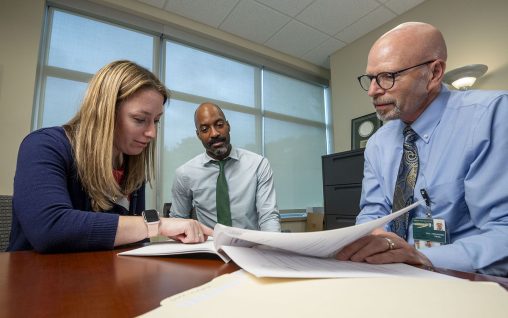
From left: Boonshoft School of Medicine faculty members Larrilyn Grant, Timothy Crawford and Paul Hershberger are participating in the State of Ohio Adversity and Resilience, or SOAR, project with support from the Ohio Department of Mental Health and Addiction Services. (Photo by Erin Pence)
Wright State University’s Boonshoft School of Medicine is participating in a statewide initiative to better understand the risk factors that trigger mental health problems and how to prevent and treat those illnesses.
The Boonshoft School of Medicine accepted an invitation from the Ohio Department of Mental Health and Addiction Services to participate in the study called the State of Ohio Adversity and Resilience, or SOAR.
Funded by a two-year, $20 million state grant, the project is led by The Ohio State University in partnership with a number of Ohio’s research and academic institutions, including Wright State. The Boonshoft School of Medicine received $106,273 in state support for participating in the study.
“Mental and behavioral health has received increasing attention in recent years,” said Paul Hershberger, Ph.D., associate dean for research affairs, professor and director of research and behavioral health in Wright State’s Department of Family Medicine. “The pandemic heightened awareness, with many people struggling with mental health issues. There’s a lot we know about risk factors and how to help people be more resilient, but there are things we don’t know.”
SOAR has two statewide projects: the SOAR Wellness Discovery Survey, which will reach out to 15,000 participants, and the SOAR Brain Health Study, which will obtain biometric and brain-imaging data from 3,600 individuals, composed of about 1,200 families.
About 8,000 of the Wellness Discovery Surveys and about 200 of the Brain Health assessments have been completed. Surveys are sent in a random picking of addresses, and those surveyed are asked if they would take part in the Brain Health Study.
“The hope is that the wellness portion of SOAR will be completed by the end of the year, and preliminary analyses can begin,” he said.
“The vision is that SOAR becomes for mental health what the Framingham Heart Study became for heart health,” Hershberger said.
The heart study began in 1948 to follow individuals and families in Framingham, Massachusetts, monitoring their risk factors for stroke and cardiovascular disease over a long time period. The study continues today.
“What we have learned has helped decrease death rates from heart disease and stroke,” Hershberger said.
Hershberger said those in the Brain Health Study will be followed over the “ensuing years to identify what can be learned from the brain MRIs, the blood work and other biometrical data.”
Hershberger is one of three collaborators representing Wright State. The other two are Timothy Crawford, Ph.D., associate professor in the departments of Population and Public Health Sciences and Family Medicine, and Larrilyn Grant, M.D., assistant professor of psychiatry.
The three faculty members will serve on various committees to study incoming data.
 Additionally, Bryan Ludwig, M.D., chair of the Department of Neurology and the Clinical Neuroscience Institute at Premier Health, is serving on the Data Safety and Monitoring Board for the Brain Health Study.
Additionally, Bryan Ludwig, M.D., chair of the Department of Neurology and the Clinical Neuroscience Institute at Premier Health, is serving on the Data Safety and Monitoring Board for the Brain Health Study.
“Our role is advisory, as are many of the other collaborating institutions,” Hershberger said. “It will evolve as it goes. We will aim to answer important research questions by having access to data and help guide future data collection.”
Hershberger outlined what SOAR hopes to accomplish: “For people who already have mental disorders or issues with substance misuse or addiction, what new treatments might we be able to develop? What can we do to better promote mental health and resilience, so people are less likely to develop mental health problems? What can we be doing for children in schools or communities to help them be more resilient?”
Overall, he said, “Hopefully, the SOAR study and the survey can help us identify what we can be doing to promote better mental health. One of the intents of SOAR is that participating institutions work to bring in additional grant money to do particular analyses of the data or use the data to propose other studies.”
He added that to his knowledge Ohio is the only state undertaking such a project.
“It’s fair to say we’re at the beginning of this major initiative,” Hershberger said. “While learning more about mental health and treatment, where this will go is unknown. The study is collecting data on a broad scale that will hopefully lead to discoveries that will have a substantial impact not only on Ohio residents but also nationally.”
Individuals who are interested in participating in the SOAR studies should contact SOARstudies@osumc.edu.

 Wright State baseball to take on Dayton Flyers at Day Air Ballpark April 15
Wright State baseball to take on Dayton Flyers at Day Air Ballpark April 15  Wright State joins selective U.S. Space Command Academic Engagement Enterprise
Wright State joins selective U.S. Space Command Academic Engagement Enterprise  Glowing grad
Glowing grad  Wright State’s Homecoming Week features block party-inspired events Feb. 4–7 on the Dayton Campus
Wright State’s Homecoming Week features block party-inspired events Feb. 4–7 on the Dayton Campus  Wright State music professor honored with Ohio’s top music education service award
Wright State music professor honored with Ohio’s top music education service award 